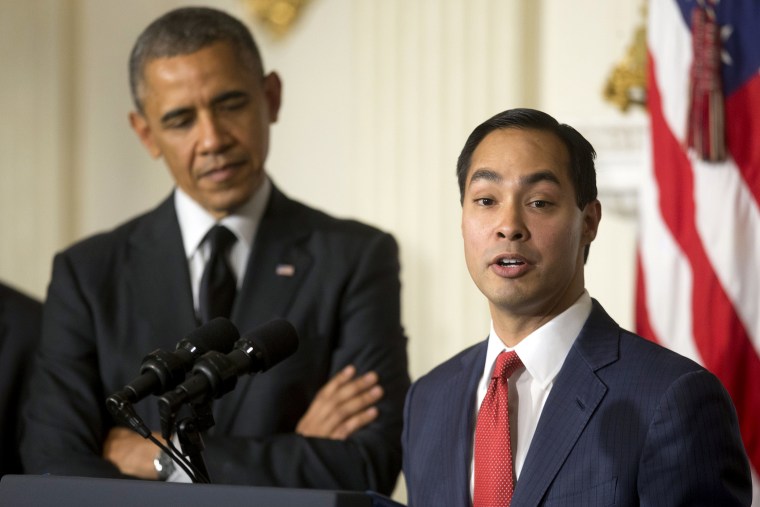As cabinet nominations go, the confirmation process for Julian Castro was exceptionally easy. President Obama nominated him in mid-May; the confirmation hearings were boring and uneventful; and yesterday, the Senate vote to add Castro to the cabinet lacked any sense of drama.
Julian Castro, the mayor of San Antonio and a rising star in the Democratic Party, was confirmed by the Senate Wednesday to become secretary of the Department of Housing and Urban Development (HUD). The Senate vote was 71-26, according to NBC News.
Looking over the
roll call, all 26 "nay" votes came from Senate Republicans. In fact, given that there are 45 GOP members in the chamber,
most of the Senate Republicans opposed Castro's nomination. We're not talking about a handful of angry ideologues; we're talking about more than half the caucus.
Keep in mind, no one questioned Castro's background or qualifications. There were no controversies or scandals for him to overcome. There were no impassioned speeches about why his nomination should be rejected. There was no other candidate for the position the GOP preferred. This was about as uncontroversial as a cabinet nominee gets.
Julian Castro, who's twin brother is a popular congressman, is a young, successful, Latino mayor with a
compelling personal background. Senate Republicans knew he'd be confirmed, but most of them didn't care. Had these 26 GOP senators defeated the nomination, they almost certainly would have voted against Obama's next choice, too, regardless of merit.
Why? Apparently most Senate Republicans voted against Castro because the president wanted to add the mayor to his cabinet. That's the reason. It's emblematic of just what's become of the contemporary Senate.
E.J. Dionne Jr.
today noted the battle "over which party gets the blame for dysfunction, inaction and disillusionment" on Capitol Hill, a topic he discussed this week with Senate Majority Leader Harry Reid (D-Nev.).
The Senate majority leader gets plenty frustrated when people claim that both parties are equally responsible for the mess in Congress. The evidence, he insists, is that the Republicans are gumming things up for their own political purposes. "It irritates me so much when people say, 'Why don't they just work together?' " Reid says. What this overlooks, he argues, is that "the Republicans made a decision ... to oppose everything Obama wants." It's in the GOP's interest to keep things from happening because it plays into a simple narrative that Reid described this way: "Democrats control the Senate. We have a Democrat in the White House. Why can't you get things done?" The result: "They won't let us vote on things that the vast majority of the American people want a vote on." "It's so bad around here," Reid adds, "that they filibuster their own bills."
Or in yesterday's case, they oppose a cabinet nominee just for the heck of it.
